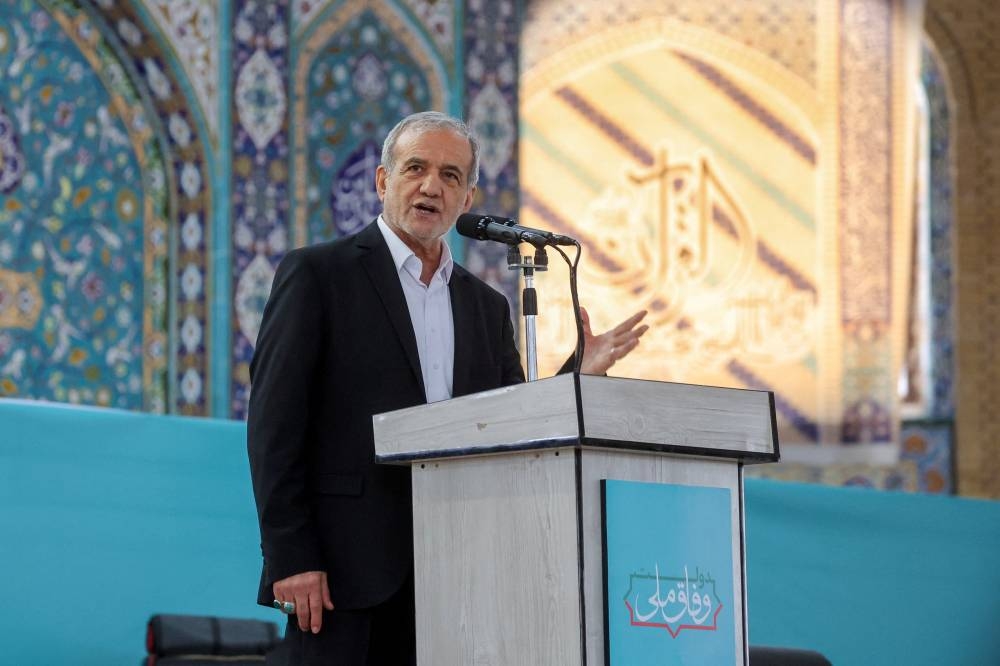Iranian President Masoud Pezeshkian said Saturday that Tehran would not attend nuclear talks with the US so long as Israel kept up its attacks on the Islamic republic.
In a call with his French counterpart Emmanuel Macron, Pezeshkian said Iran favoured diplomacy, but will not "accept irrational demands under pressure or... sit at the negotiating table while the Zionist regime continues its attacks", according to a readout shared by the Iranian presidency.
Macron said in a statement of his own that he had asked Pezeshkian to "return swiftly to the negotiating table".
The International Atomic Energy Agency said Iran's Nuclear Regulatory Authority had informed it there was no change in off-site radiation levels in Isfahan, site of one of the nuclear targets struck on Friday by Israeli forces.
Earlier, the IAEA said four critical buildings at the Isfahan nuclear site had been damaged, including a uranium conversion facility and a fuel plate fabrication plant.
"As in Natanz, no increase in off-site radiation expected," the agency said in a post on X. Iran's state TV said yesterday that "heavy and destructive" attacks by Iran against Israel were expected within the coming hours, as the Israeli military continues to strike several targets across Iran.
Israel pounded Iran for a second day yesterday and Prime Minister Benjamin Netanyahu said its campaign would intensify, while Tehran called off nuclear talks that Washington had held out as the only way to halt the bombing. A day after Israel wiped out the top echelon of Iran's military command with a surprise attack on its old foe, it appeared to have hit Iran's oil and gas industry for the first time, with Iranian state media reporting a blaze at a gas field.
Netanyahu said Israel's strikes had set back Iran's nuclear programme possibly by years and rejected international calls for restraint.
In Tehran, Iranian authorities said around 60 people, including 29 children, were killed in an attack on a housing complex, with more strikes reported across the country. Israel said it had attacked more than 150 targets.
Iran had launched its own retaliatory missile volley on Friday night, killing at least three people in Israel. Air raid sirens sent Israelis into shelters as waves of missiles streaked across the sky and interceptors rose to meet them.
US President Donald Trump said it was not too late to halt the Israeli campaign, but only if Tehran quickly accepted a sharp downgrading of its nuclear programme at talks with Washington which had been scheduled for Sunday.
Host Oman confirmed Saturday that the next round of talks had been scrapped. Iranian Foreign Minister Abbas Araqchi said holding talks was unjustifiable while Israel's "barbarous" attacks were ongoing.
Worries about potential disruption to the region's oil exports had already boosted the price of crude by about 7% on Friday.
An Iranian general, Esmail Kosari, said Tehran was reviewing whether to close the Strait of Hormuz controlling access to the Gulf for tankers.
With Israel saying its operation could last weeks, and urging Iran's people to rise up against their Islamic clerical rulers, fears have grown of a regional conflagration dragging in outside powers.
"If (Supreme Leader Ayatollah Ali) Khamenei continues to fire missiles at the Israeli home front, Tehran will burn," Israeli Defence Minister Israel Katz said.
Tehran warned Israel's allies that their military bases in the region would come under fire too if they helped shoot down Iranian missiles.
Trump and Russian President Vladimir Putin spoke for 50 minutes Saturday, the Kremlin said, with Putin condemning Israel's operation and Trump describing events in the Middle East as "very alarming".
Israeli military spokesperson Brigadier General Effie Defrin cautioned as night fell on Saturday that Iranian attacks were not over, urging the public to follow public safety guidelines.
In Iran, Israel's two days of strikes destroyed residential apartment buildings, killing families and neighbours as apparent collateral damage in strikes targeting scientists and senior officials in their beds.
Iran said 78 people were killed on the first day and scores more on the second, including 60 when a missile brought down a 14-storey apartment block in Tehran, where 29 of the dead were children.
Israel sees Iran's nuclear programme as a threat to its existence, and said the bombardment was designed to avert the last steps to production of a nuclear weapon.
A military official on Saturday said Israel had caused significant damage to Iran's nuclear facilities at Natanz and Isfahan, but had not so far taken on another uranium enrichment site, Fordow, dug into a mountain.
Tehran insists the programme is entirely civilian. However the UN nuclear watchdog reported it this week as violating obligations under the global non-proliferation treaty.
"The Iran US talks scheduled to be held in Muscat this Sunday will not now take place," Omani Foreign Minister Badr Albusaidi said in a post on X.
"Diplomacy and dialogue remain the only pathway to lasting peace," he added.

Iranian President Masoud Pezeshkian speaks during a meeting in Ilam, Iran, on Thursday. In a call with his French counterpart Emmanuel Macron, Pezeshkian said Iran favoured diplomacy, but will not "accept irrational demands under pressure or... sit at the negotiating table while the Zionist regime continues its attacks."
